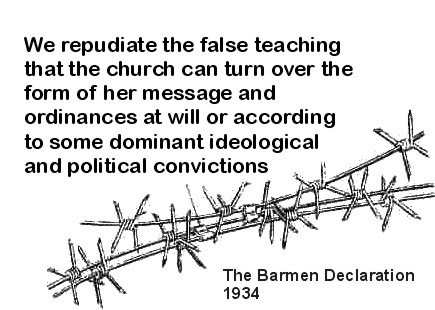| Churches
in Germany, resisting Hitler and Nazism. |
 |
|
|
When Hitler came
to power in Germany, he wanted to unify all the Protestant churches into
one national, German church; these so-called "German Christians" used
Christianity to justify Nazism and anti-Semitism.
A struggle ensued between the pro-Nazi "German Christians" and those who
refused to comply. Perhaps one-tenth of Protestants resisted. Some Catholics
were active in hiding Jews or helping them escape. One of the resistance
movements was the "Confessing Church," comprised of Lutheran, Reformed,
and Union church pastors and lay people. The "Barmen Declaration" of 1934
stated that the church's proclamation consists only in Jesus Christ, not
in Nazism. Confessing Church people engaged in various forms of resistance,
ranging from hiding Jews, to training pastors in an illegal seminary,
to secret plots to assassinate Hitler. Leaders of the Confessing Church
included theologians Martin Niemöller (1892-1984), Karl
Barth, and Dietrich Bonhoeffer,
a Lutheran pastor executed by the Nazis in 1945.
|